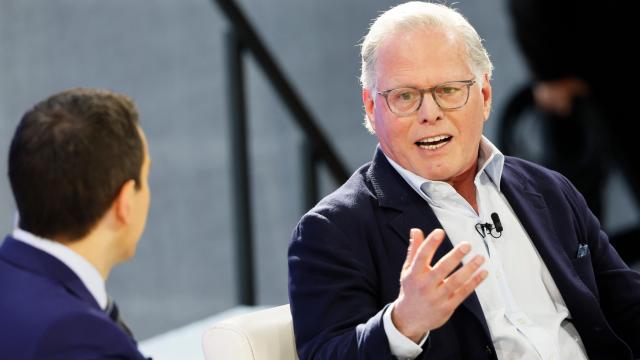Running a movie studio has proven to be challenging for reality television mogul turned Warner Bros. Discovery CEO David Zaslav. As 2023 comes to an end, he looks to the upcoming year to continue to answer for the choices being made.
Between leading the charge to pivot back to theatrical releases after a pandemic-era stint of releasing films simultaneously on the company’s streaming service, to a rebranding of that streaming service, massive layoffs, shelving a whole Batgirl film, navigating strikes that screeched the industry to a halt, and then trying to can a film starring characters from WB’s legendary mascot franchise, Looney Tunes—it’s been a ride for the studio under Zaslav’s leadership. And it’s one that he seems aware that he needs to answer for. “We’re at a very hard time that requires hard decisions, and many of them are unpopular,” he was quoted by Deadline as saying in a Q&A during the New York Times’ DealBook conference.
He continued, “If we were going to start today, what content do we need? What content is going to help us? How many people do we need? What should HBO look like? What should Warner Brothers look like?” From where we’re standing now, it’s tempting to wonder if the iconic studio is being sold for parts, with projects going off to other places like Prime Video—as seen in the case of DC’s animated Merry Little Batman, for instance. And then there’s the shelving of Coyote vs. Acme, the live-action/animation hybrid starring John Cena, a decision that was thankfully reconsidered; the film is now being shopped around. Still, it’s a bit odd that a feature starring beloved characters who’ve long been synonymous with Warner Bros. might be released by another outlet during the studio’s 100-year anniversary. Leaving us asking, truly: “What’s up, doc?”
Zaslav chalks it up to having the “courage” to make mistakes, presumably: “If we produce a show, a $US100-million movie… We’ve spent the $US100 million dollars and if we don’t release it. It’s gone. We don’t have any real benefit from it. The question is, should we take certain of these movies and open them in the theater and spend another $US30 or $US40 million to promote them? And Warner Brothers team and HBO made a number of decisions. They were hard. But when I look at the health of our company today, we needed to make those decisions. And it took real courage.”
Zaslav hopes to continue to change public opinion on the way he’s handling things at Warner Bros. But his positioning is hard to place, as he avoided a question about his high pay during a time when working-class writers and actors were picketing: “My focus was we need to settle this strike. This is really hurting people. Every day that we were on strike, that people weren’t working was a bad day.” He also reiterated his point about being quoted as saying unionized workers were right. “I did fight, and [Disney’s] Bob Iger…When I spoke to [SAG-AFTRA leaders] Fran [Drescher] and Duncan [Crabtree-Ireland] before, I said, ‘I agree with a lot of what you’re saying’.”
Warner Bros. properties shifting and selling continues as the year draws to a close and the industry gets back to work. Most recently the entire Looney Tunes catalogue was “mistakenly” published in a release as leaving Max soon, which created another uproar until it was quickly corrected. The studio’s outlook remains to be seen as the industry gets a new footing and start, but here’s hoping its creatives can be creative while being compensated fairly for their art, and that its libraries of classic film, TV, and animation will command the respect they deserve.
Want more entertainment news? Check out when to expect the latest Marvel, Star Wars, and DC releases, what’s coming to cinemas in Australia this year, and everything streaming this month across all platforms. Check out our dedicated Entertainment tab for more.
